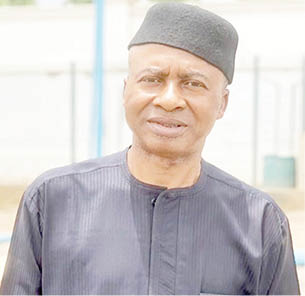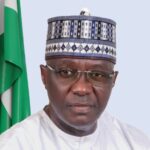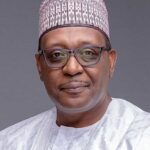Professor Charles Nwekeaku is the secretary of the Igbo Elders Consultative Forum, as well as the secretary, Ohanaeze Council of Elders in the 19 northern states and the Federal Capital Territory (FCT). In this interview, the professor of New Public Management is of the opinion that nothing is working in Nigeria because of the current system of government, adding that it can only be fixed through restructuring to regional arrangement.
What is your position on the calls for return to regional form of government in Nigeria?
We need the regional/zonal system of government to save the country from collapse. What we have currency are depreciation, poverty, hyperinflation, mass unemployment, unprecedented insecurity, dysfunctional public services and educational systems. Nothing seems to be working because of the way things have been structured in the country.
Nigerians are brilliant. You are talking about a country in which, in 1967, the breakaway Biafra was able to refine crude oil and supply to various homes. They produced inter-ballistic missiles called ‘Ogbunigwe,’ most of the ammunition they used and other innovations. Other parts of Nigeria are also gifted in one way or another, but the system we operate in Nigeria is dysfunctional. We say we are practising federalism but what we have is unitary centralism. In Nigeria, you have 68 items in the exclusive list, making Nigeria’s president the most powerful in the world.
In Nigeria, while you have many people in poverty, a few are swimming in affluence. Therefore, the Ohanaeze Ndigbo and the Igbo Elders Consultative Forum and other bodies are of the view that for Nigeria to move forward, this country has to be restructured. And we have consistently been calling on the federal government and Mr President to implement, without further delay, the 2014 National Conference report. If implemented fully, that conference is capable of addressing about 80 per cent of the problems confronting Nigeria.
The Igbo position is that we want the various sections of the country to govern themselves in a kind of confederation arrangement. We don’t want to talk about the four regions we had in the past, but the six regions, and to accommodate the so-called minority areas. I say the ‘so-called minority areas’ because they are actually in the majority when you put them together. We want restructuring that allows every section a modicum of autonomy to organise themselves the way they deem fit, harness the resources in their zones and pay tax to the federal government.
There are allegations that individuals from the South-East contributed to the system in place today in Nigeria; what is your take?
Some Nigerians like to turn history upside down. If you ask them to explain, they will tell you that Aguiyi Ironsi, an Igbo man introduced Decree No 34 to unify the country. However, they will not tell you that he was responsible for stopping the success of the January 15, 1966 coup. That coup, some claimed, was an Igbo coup, but young officers organised it from different parts of the country. Chukwuma Kaduna Nzeogwu was an Igbo man only in name but grew up in the North; and the Igbo were not the majority among the officers who participated in the coup. You remember that many Igbo senior officers also quelled that coup.
Remember that during the 1967 Aburi Accord, the Eastern Region Government, represented by Colonel Odumegwu Ojukwu, suggested that for Nigeria to move forward, it ought to be run on a kind of confederal arrangement. It was accepted, but when they returned to Nigeria, General Yakubu Gowon and some of his colleagues were advised otherwise and they jettisoned the accord. So, people calling for a zonal arrangement are re-echoing that accord. So, to say that the Igbo brought unitary government to dominate everybody is not true. They don’t intend to dominate anybody. The Igbo are essentially businessmen, and that is why you see them investing in every part of the country.
Saying that the Igbo want to go is not true; if there is any group that wants Nigeria to continue as one, it is the Igbo because in every part of the country, after the indigenes, the next are the Igbo. They invest any money they make back into the country, unlike foreign investors who repatriate profit.
The Igbo is an egalitarian and republican society, check the pre-colonial society. We didn’t have one person controlling political power or an absolute monarchy as power was shared among different groups like titled elders, age groups, Umuada, town union executives and so forth. In Igboland, you could see the chief priest perform judicial function, the age groups perform executive function; and the legislative function was, and is still being performed by the village assembly, which comprises every male adult. Therefore, it is wrong to say the Igbo contributed to the unitary system in Nigeria.
There are fears that a return to the regional system of government could impede development in some areas; do you think so?
That is a misconception. What they call development is mere growth. Nigeria has been growing without development, which is increase in quantity without quality. What can Nigeria boast of in development? If power is maintained at the centre and not devolved, Nigeria will continue to struggle. Is an increase in the minimum wage development?
How will regional arrangement impact on the living standard of the people?
A regional government will empower the regions to go and harness their resources, and there will be competition. A minimum wage of N70,000 cannot buy a bag of rice. So, what development are they talking about? When I was in the university, with 50kobo you could eat to your satisfaction, today, N5,000 cannot buy a plate of food for you in many restaurants in Nigeria.
Today, there is no competition. What we have is that monthly, governors go to share allocations in Abuja and some of them will travel abroad to squander the money; local governments would do the same.
However, if you restructure Nigeria, people will have that incentive for production and this will curb corruption. Nigerians are gifted, and when we devolve power to the regions, we will witness real development. We have talented people who can develop this country, but they are not given the opportunity.
Some people say the problem with Nigeria is leadership, do you agree with them?
I agree with them. According to Niccolo Machiavelli in his book, The Prince, leadership is the major factor that determines the rise and fall of any country. If you look at the empires, the moment they had good leaders, they began to rise; and they fell when they had bad leaders. For him, the moment any country has a leader that captures the imagination of the country, there is no limit to where the country can go.
Any day Nigeria gets a good leader, things will turn around. A good leader will lead by example. A good leader will not share money during elections, he will not award contracts to his cronies and will give every part a sense of belonging and not favour ethnicity and religion.

 Join Daily Trust WhatsApp Community For Quick Access To News and Happenings Around You.
Join Daily Trust WhatsApp Community For Quick Access To News and Happenings Around You.



